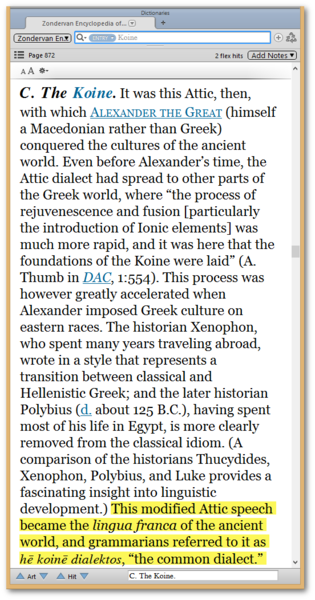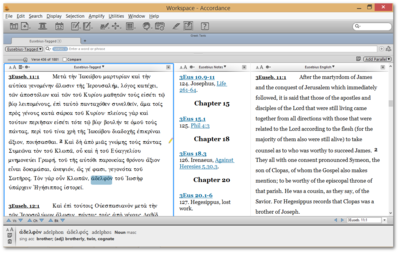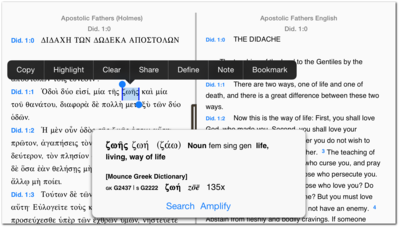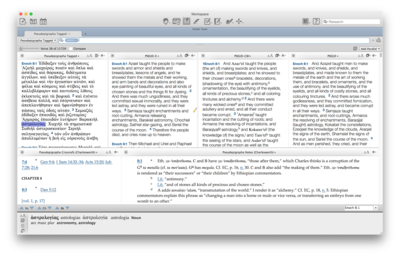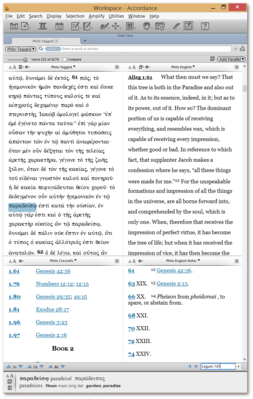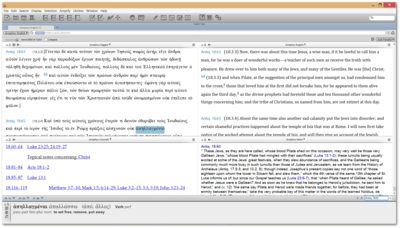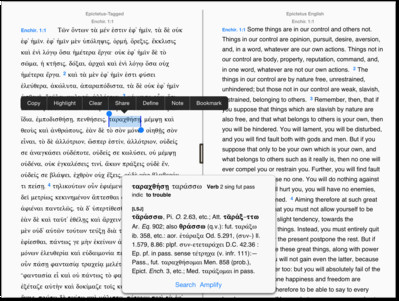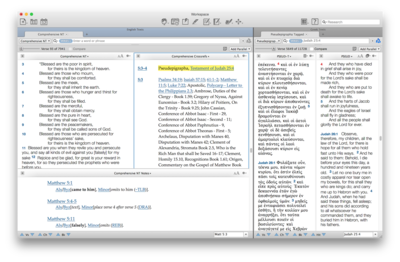A while back, I was asked to preach a sermon at my church explaining the idea of canon, that is, the list of writings accepted as sacred or inspired in my faith tradition. I titled my sermon, “What’s in Your Bible?” making a play on the phrase, “What’s in your wallet?” from the ongoing series of credit card commercials on television. Although I can never be certain since our church originated in the 1830s, I’d like to think that I may be the first person who ever read from the Pseudepigrapha in the pulpit at our church! No, I was not submitting apocalyptic literature attributed to Enoch as canon, but I was trying to give our church members a taste for ancient writings outside the standard 66 books in the Protestant canon.
Seriously, though—why do extrabiblical ancient writings like the Pseudepigrapha, the writings of Josephus and Philo, or the Apostolic Fathers even matter? As a student of mine once asked, “Isn’t the Bible enough?” Well, setting that question aside since we would have to determine “Enough for what?” let me instead suggest three reasons for wanting to study extrabiblical Greek texts in addition to the Bible:
(1) Extrabiblical Greek writings improve our own understanding of biblical Greek. When I took introductory Greek classes, we had two kinds of practice sentences to translate: simple sentences from the New Testament, and simple sentences made up by the writer that never actually occurred anywhere in ancient literature. Some of the made up sentences were rather odd in hindsight such as “βάλλει τὸ ἱμάτιον αὐτοῦ ἐπὶ τοῦ λίθου” (“He throws his clothing on the stone”)—what? I’ve seen a much better trend in some Greek intro workbooks in recent years in which the authors include actual sentences from other Greek writings such as the Apostolic Fathers, the Septuagint, Josephus, or even the Enchiridion.These works give a greater context to the language and help us sharpen our understanding of koine Greek. They give us good practice.
(2) Extrabiblical Greek writings give us insight into the mindset and popular beliefs of people in New Testament times. Psalms of Solomon 17 from the Pseudepigrapha gives us great insight into the contemporary expectation and popular understanding of the Messiah’s role by the time Jesus arrived on the scene in the first century. Josephus and Philo give us two very different interpretive schools of thought for understanding the Old Testament in a time roughly concurrent with the writing of the New Testament. Jude even quotes from 1 Enoch! No writing, including the Bible, was written in a vacuum. These other writings help give us understanding of the context in which the New Testament was written.
(3) Extrabiblical Greek writings are invaluable for the serious student of history. The writings of the Apostolic Fathers, the Apologists, Eusebius, and even apocryphal New Testament documents including Nag Hammadi writings such as the Gospel of Thomas, give us insight into the growth of the church and different movements that rose and fell after the time of the Apostles. Certain writings such as the Didache, Shepherd of Hermas, and 1 Clement were held by some early Christians to be Scripture. Although they didn’t make “the final cut,” it’s important to actually read them (as opposed to just reading about them) to see for ourselves why some may have held them to be divinely inspired and others did not.
If any of the three reasons I mentioned above for studying extrabiblical texts appeal to you–or if you have other reasons of your own–you will want to consider adding the bundles below to your Accordance Library. Most of these texts come with translations as well, so you can read Greek and English side-by-side in parallel columns that scroll together.
Early Greek Christian Add-on: Apocryphal And Other Early Greek Christian Writings
Unfortunately (or fortunately, depending on your perspective!), the ancient world was not as obsessive about record-keeping as we are today. We have lots of questions about the growth of Christianity after the details provided in the Book of Acts and New Testament epistles. We are fortunate, however, to have the record set forth by Eusebius of Caesarea (AD 260/265 – 339/340) of the events from the New Testament to his day.
In addition to Eusebius’ Ecclesiastical History, you will also receive Athanasius’ Incarnation and Against the Gentiles, Christian Apologists (Irenaeus, Justin Martyr, Athenagoras, Theophylus of Antioch), Apocryphal Gospels, Apocryphal Apocalypses, and NT Apocryphal Acts.
Click the above image for a full size product illustration.
Early Greek Christian Add-on
$269
The Apostolic Fathers is a fascinating collection of works because these are the “second generation” writings immediately after the record left in the New Testament. As mentioned earlier, certain works in the Apostolic Fathers like The Didache and the Shepherd of Hermas were even considered by some early Christians as Scripture. Nevertheless, while these works remain an important collection of writings revered by early Christians, in the end, they were not included in the final canon of the New Testament.
This add-on includes both the Holmes and the Lightfoot versions of the tagged Greek Apostolic Fathers as well as corresponding English translations.
Click the above image for a full size product illustration.
The Pseudepigrapha is “A collection of ancient Jewish and Hellenistic writings that were written during the intertestamental period but are not part of the canonical OT or the Apocrypha […]. This collection includes various types of literature, some of it attributed to biblical persons, such as Enoch, Ezra, Baruch, Elijah, Abraham, Isaac and Jacob, but in reality these names are pseudonyms” (IVP Pocket Dictionary of Biblical Studies). Still read as popular literature in New Testament times, the Pseudepigrapha is invaluable for understanding the mindset and expectation of both Jewish and Christian believers in the first century.
This massive bundle includes the tagged Greek texts and a new translation of the Greek by Craig Evans, the classic compilation and translation of R. H. Charles, and the critical Charlesworth edition with parallel versions and notes.
Click the above image for a full size product illustration.
Philo was a first century Jewish philosopher living in Alexandria, Egypt. His writings demonstrate a Hellenized allegorical form of interpretation of the Old Testament. Although Philo was Jewish and not Christian, the allegorical method of interpretation was very influential upon the early church. Papias, whose writings are included in the Apostolic Fathers Add-on referred to Philo as “an ancient interpreter of the church” and “contemporary of the Apostles” (Pap 13:1).
This set includes all the extant Greek texts of Philo and the translation by C.D. Yonge.
Click the above image for a full size product illustration.
Writings of Josephus
Having initially fought against the Romans before defecting to their side, Josephus will forever remain a controversial figure to history. Nevertheless, his writings are invaluable not only for understanding the culture of conflict between the Jews and Romans but also for insights into interpretation of the Hebrew Scriptures. Josephus recorded Jewish history with special emphasis on the first century AD and the First Jewish-Roman War, including the Siege of Masada. His works provide valuable insight into first century Judaism and the background of early Christianity.
This set offers the 1890 Niese Greek text with the Whiston translation and extensive notes.
Click the above image for a full size product illustration.
Writings of Josephus Add-on
$99.90
The writings of Stoic philosopher Epictetus (recorded by his student Arrian) did hold influence with some in the early church who tried to find common ground with Stoic teachings and Christian thought. However, that fact is often not why the writings of Epictetus (AD 55 – 135) are often so valuable to the student of the New Testament. Rather, his writings are an excellent example of koine Greek contemporary with the New Testament.
These writings currently include The Enchiridion, or Handbook of Epictetus, a manual of Stoic ethical advice, the first of four surviving Discourses, and the recently added preface to the Discourses by Epictetus’ student, Arrian. The Greek text is designed to run in parallel with Elizabeth Carter’s English translation.
Click the above image for a full size product illustration.
Writings of Epictetus
$49.90
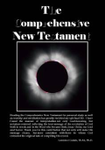
Comprehensive Bible Cross References
Buy Now for $49.90


